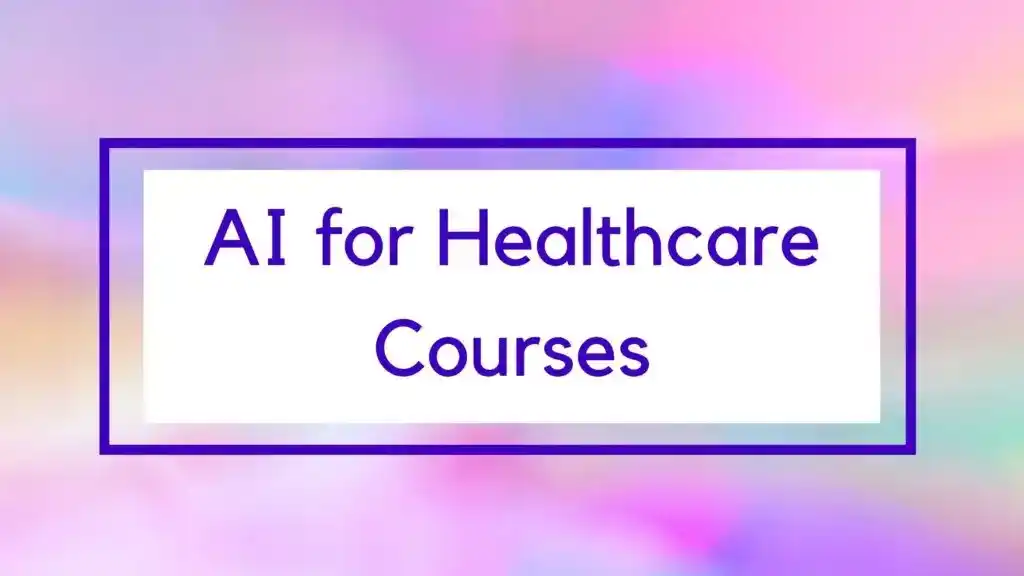Artificial Intelligence plays an important role in Healthcare in various ways like brain tumor classification, medical image analysis, bioinformatics, etc. So if you are interested to learn AI for healthcare, I have collected 7 Artificial Intelligence Courses for Healthcare. I hope these courses will help you to learn Artificial Intelligence for healthcare.
- 1. AI for Healthcare– Udacity
- 2. AI for Medicine Specialization– deeplearning.ai
- 3. AI in Healthcare Specialization- Stanford University
- 4. Statistical Analysis with R for Public Health Specialization– Imperial College London
- 5. Fundamentals of Machine Learning for Healthcare- Stanford University
- 6. AI for Medical Diagnosis- deeplearning.ai
- 7. Biostatistics in Public Health Specialization– Johns Hopkins University
Best Artificial Intelligence Courses for Healthcare in 2025
I have filtered these courses on the following criteria-
Criteria-
- Rating of these Courses.
- Coverage of Topics.
- Engaging trainer and Interesting lectures.
- Number of Students Benefitted.
- Good Reviews from various aggregators and forums.
So, without further ado, let’s start finding the best Artificial Intelligence Courses for Healthcare–
1. AI for Healthcare– Udacity
| Rating- | 4.6/5 |
| Time to Complete- | 4 months (if you spend 15 hours/week) |
| Level- | Advanced |
| Programming Language- | Python |
This AI for Healthcare Nano-Degree Program is dedicated to AI for Healthcare. There are 4 courses and 4 projects in this Nanodegree program.
This Nanodegree is more practical in nature that means throughout this Nanodegree program, you will work on various hands-on projects.
This is an advanced-level program and not for beginners. To excel in this program, you must have previous intermediate knowledge in Python and Machine Learning.
You will understand U.S. healthcare data security and privacy best practices e.g. HIPAA, and HITECH. This program will also cover 2D medical imaging and 3D medical imaging.
Overall this course is best for advanced learners who want to dive deeper into AI for the healthcare domain.
My Experience With This Course
When I took the AI for Healthcare Nanodegree from Udacity, I was already comfortable with Python and machine learning, but this course really expanded my knowledge. The hands-on projects, like detecting pneumonia from chest X-rays and quantifying brain volume, were both challenging and rewarding.
Working on real-world problems helped me see the real impact of AI in healthcare. However, the course is quite advanced and requires a good grasp of Python and machine learning beforehand. The high cost might be a drawback, but the practical experience and career support made it worth it for me.
These are the project lists-
Project List-
- Pneumonia Detection from Chest X-Rays
- Hippocampus Volume Quantification for Alzheimer’s Progression
- Patient Selection for Diabetes Drug Testing
- Motion Compensated Pulse Rate Estimation
Pros-
- You will get a chance to work on real-world projects with Industry Experts.
- You will get Technical mentor support.
- Along with this, you will get career services.
Cons-
- Projects are not easy to complete. A lot of effort is required.
- The Nanodegree Program is expensive compared to other courses.
Who Should Enroll?
- Those who have Intermediate Python and Machine Learning knowledge.
Interested to Enroll?
If yes, then check here- AI for Healthcare
2. AI for Medicine Specialization– deeplearning.ai
| Rating- | 4.7/5 |
| Time to Complete- | 3 months (If you spend 7 hours/week) |
| Level- | Intermediate |
| Programming Language- | Python |
This AI for Medicine Specialization Specialization Program is a brand new program dedicated to Healthcare. There are 3 courses in this program.
The concepts are explained by using real-life scenarios which helps students to understand the complex topics easily. This is also a practical based course.
In the first course, you will work on a practical exercise, “Disease Detection with Computer Vision“. In the second course, you will learn how to build a linear prognostic model using logistic regression.
There are various practical exercises are included in this program such as Measuring Treatment Effects, Segmentation on Medical mages, etc.
My Experience With This Course
I found the AI for Medicine Specialization a great choice for improving my skills in healthcare AI without a huge time commitment. The course used real-life examples to explain complex topics like disease detection and prognosis, which made learning enjoyable.
The practical exercises were very useful, but I did find the first course a bit basic and focused more on coding than on theory. Overall, it’s a good balance of theory and practice, especially for those with some intermediate knowledge.
These are the 3 courses-
Courses List-
- AI for Medical Diagnosis
- AI for Medical Prognosis
- AI For Medical Treatment
Pros-
- You will get a Shareable Certificate and Course Certificates upon completion.
- You will also get Course Videos & Readings, Practice Quizzes, Graded Assignments with Peer Feedback, Graded Quizzes with Feedback, and Graded Programming Assignments.
Cons-
- The first course is a basic introduction course and doesn’t cover the concepts in detail.
- The instructor focused on coding rather than covering theoretical concepts.
Who Should Enroll?
- Those who can program in Python and are comfortable with statistics and probability.
Interested to Enroll?
If yes, then check here- AI for Medicine Specialization
3. AI in Healthcare Specialization– Stanford University
| Rating- | 4.8/5 |
| Time to Complete- | 9 Months (If you spend 2 hours/week) |
| Level- | Beginner |
| Programming Language- | Python |
This AI in Healthcare Specialization is another specialization program offered by Coursera. There are 5 courses in this specialization program. This program is suitable for beginners and begins with a basic introduction to health care and clinical data.
This program is the perfect balance between theory and practice. There are various practical exercises and videos for learning.
You will learn how to convert messy clinical data into a form where you can analyze something meaningful. The instructors also explain Machine Learning and Deep Learning algorithms and how you can use these algorithms in healthcare.
The last course is the Capstone project where you have to perform all the stages of Machine Learning starting from data collection to model deployment.
Overall this course is good for beginners who want to learn how they can use Artificial Intelligence in the healthcare domain.
My Experience With This Course
I chose the AI in Healthcare Specialization from Stanford University to get a solid introduction to applying AI in healthcare. The course starts with basic concepts and gradually moves to more advanced topics, ending with a Capstone project where you apply everything you’ve learned.
This course was a great way for me to start in the field, though the early courses on healthcare basics might feel less engaging if you’re more interested in AI. It’s a solid choice for beginners.
These are the 5 courses-
Courses List-
- Introduction to Healthcare
- Introduction to Clinical Data
- Fundamentals of Machine Learning for Healthcare
- Evaluations of AI Applications in Healthcare
- AI in Healthcare Capstone
Pros-
- You will get a Shareable Certificate and Course Certificates upon completion.
- Good course to understand the healthcare industry.
- You will work on various practical exercises.
- The pace of teaching is perfect.
- Work on the case study of the current COVID data.
Cons-
- The first course was related to the healthcare industry and not related to AI that’s why the AI learners might feel bored in this course.
Who Should Enroll?
- There is no prior experience required. Anyone interested in AI for healthcare can enroll.
Interested to Enroll?
If yes, then check here- AI in Healthcare Specialization
4. Statistical Analysis with R for Public Health Specialization– Imperial College London
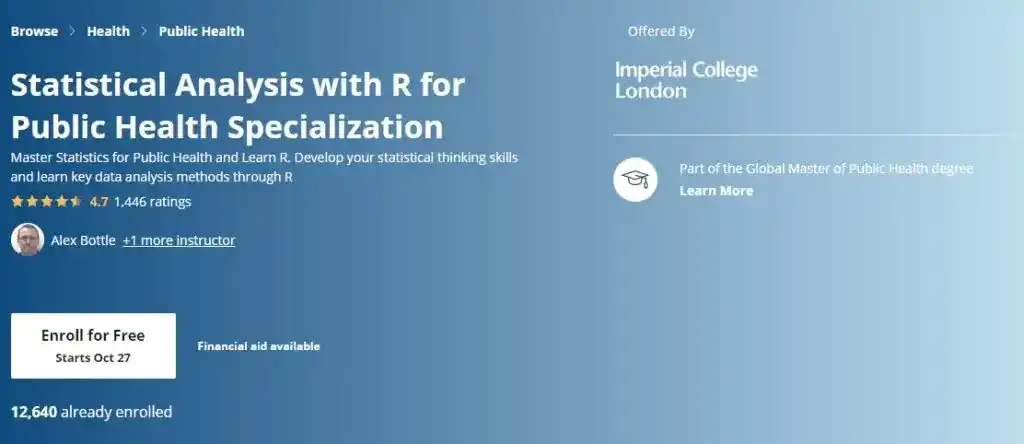
| Rating- | 4.7/5 |
| Time to Complete- | 4 Months (If you spend 3 hours/week) |
| Level- | Beginner |
| Programming Language- | R |
This Statistical Analysis with R for Public Health Specialization program is mainly dedicated to the Statistical Analysis for Public Health. This program has 4 courses and uses R programming to teach Statistics basics.
In this program, you will learn statistics basics such as types of variables, common distributions, sampling, etc. You will learn the Parkinson’s Disease Study Issues.
After that, you will learn R Programming basics and RStudio. Linear Regression and Logistics Regression are also covered in this program.
Throughout this program, you will work on various practical exercises. If you want to work on hands-on practices, then this program is good for you.
My Experience With This Course
I took the Statistical Analysis with R for Public Health Specialization to build my statistical skills for public health. The course was thorough, covering everything from basic statistics to more advanced techniques using R.
The practical exercises were very helpful. However, I found that there were a lot of reading materials and the last course only covered survival analysis at a basic level. Despite these minor issues, it was a great introduction to statistics in public health.
These are 4 courses-
Courses List-
- Introduction to Statistics & Data Analysis in Public Health
- Linear Regression in R for Public Health
- Logistic Regression in R for Public Health
- Survival Analysis in R for Public Health
Pros-
- You will get a Shareable Certificate and Course Certificates upon completion.
- The instructors are good and explained the topics in a simple and easy-to-understand manner.
- You will also get Course Videos & Readings, Practice Quizzes, Graded Assignments with Peer Feedback, Graded Quizzes with Feedback, and Graded Programming Assignments.
Cons-
- The instructor gives too many reading materials in course 1 rather than explaining the concepts in video tutorials.
- The last course covers only the basics of Survival Analysis.
Who Should Enroll?
- Anyone can enroll who has an interest in medical and statistics. This is a Beginner Level program. No medical, statistical, or R knowledge is assumed.
Interested to Enroll?
If yes, then check out all details here-Statistical Analysis with R for Public Health Specialization
5. Fundamentals of Machine Learning for Healthcare– Stanford University
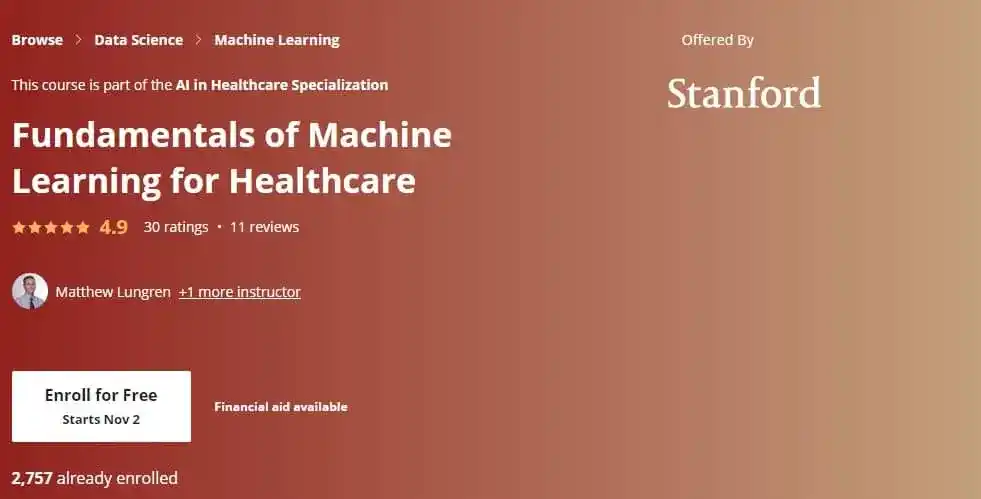
| Rating- | 4.9/5 |
| Time to Complete- | 12 Hours |
| Level- | Beginner |
| Programming Language- | Python |
This Fundamentals of Machine Learning for Healthcare course is part of AI in Healthcare Specialization. The main objective of this course is to explain why Machine Learning plays an important role in healthcare.
Throughout this course, you will learn about Machine Learning and Deep Learning algorithms. This course claims that beginners can enroll in this course, but I thought some previous Machine Learning Knowledge is good to have.
You will learn Neural Networks, CNN, Natural Language Processing Recurrent Neural Networks, etc. Various practical exercises are there in the course.
My Experience With This Course
The Fundamentals of Machine Learning for Healthcare course was a quick yet thorough introduction to machine learning techniques in healthcare. I appreciated the focus on neural networks, CNNs, and NLP.
Although the course is aimed at beginners, having some prior knowledge of machine learning made it easier for me to follow. The course was well-structured and included practical exercises, but it’s better suited for those with at least a basic understanding of machine learning concepts.
Pros-
- You will get a Course Certificate upon completion.
- The course material is well-structured.
- You will also get Course Videos & Readings, Practice Quizzes, Graded Assignments with Peer Feedback, Graded Quizzes with Feedback, and Graded Programming Assignments.
Cons-
- Without having some previous knowledge of Machine Learning, it’s quite hard to understand the concepts.
Who Should Enroll?
- This is a beginner-level course, so anyone can enroll who wants to know an overview of Machine learning in healthcare.
Interested to Enroll?
If yes, then check out all details here- Fundamentals of Machine Learning for Healthcare
6. AI for Medical Diagnosis– deeplearning.ai
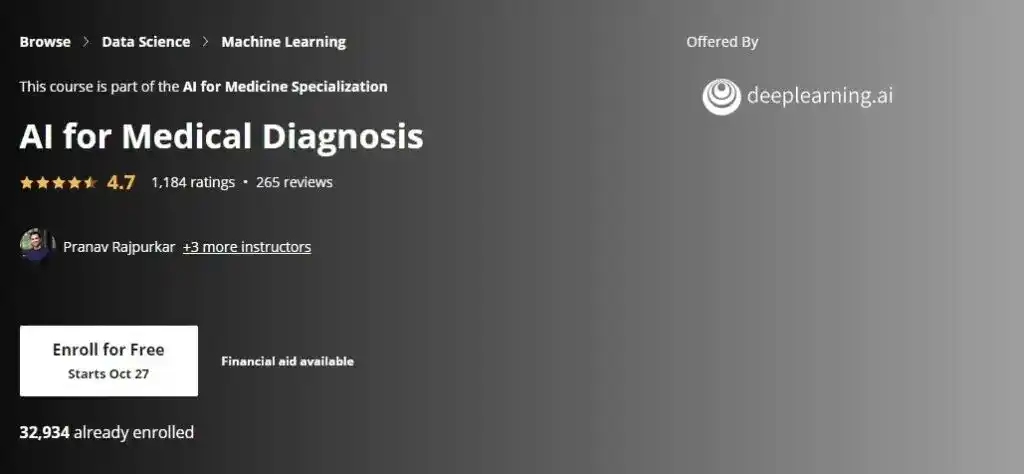
| Rating- | 4.7/5 |
| Time to Complete- | 19 Hours |
| Level- | Intermediate |
| Programming Language- | Python |
This AI for Medical Diagnosis course is part of AI for Medicine Specialization. This is a short course to learn how to use Computer Vision and Convolutional Neural networks in Medical Image Diagnosis.
The instructor explains how CNN is used in Eye Disease and Cancer Diagnosis. And there is one practical exercise related to Disease Detection with Computer Vision.
Confusion Matrix is also covered in this course. The Confusion Matrix is a way to find how many predicted categories or classes were correctly predicted and how many were not.
You will use MRI Images to perform Image Segmentation.
My Experience With This Course
Taking the AI for Medical Diagnosis course was eye-opening for me, especially in understanding how convolutional neural networks are used in medical image diagnosis.
The course provided practical exercises on using CNNs for diagnosing eye diseases and cancer, which was very insightful. However, I found the course structure a bit confusing at times. Despite this, it was valuable for learning how to apply AI in medical imaging.
Pros-
- You will get a Course Certificate upon completion.
- You will understand these complex topics easily with the help of good visual representation.
- Andrew NG taught some topics.
Cons-
- The structure of this course is not up to the mark and it may confuse you.
Who Should Enroll?
- Those who have a working knowledge of deep neural networks, and are comfortable in Python programming.
Interested to Enroll?
If yes, then check out all details here-AI for Medical Diagnosis
7. Biostatistics in Public Health Specialization– Johns Hopkins University
| Rating- | 4.8/5 |
| Time to Complete- | 4 months( If you spend 4 hours/week) |
| Level- | Beginner |
| Programming Language- | NA |
This Biostatistics in Public Health Specialization is the perfect program to learn statistical concepts used in Public health. This program is math heavy program.
Throughout this program, you will learn various statistical concepts such as Samples Versus Population, Normal Distribution, Sampling Distribution, Confidence Intervals, Hypothesis Testing, etc.
Along with that, you will also learn Simple Linear Regression, Simple Logistic Regression, Simple Cox Regression, Multiple Logistic Regression, and Multiple Cox Regression.
There are 4 courses in this specialization program and various practical exercises to check your understanding.
My Experience With This Course
I chose the Biostatistics in Public Health Specialization to enhance my understanding of statistical methods used in public health research. The program covered a wide range of topics from basic statistics to more complex regression techniques, which was very helpful for my work.
The course was rigorous and included practical exercises, though some lecture videos were not as clear as I would have liked. Overall, it’s a comprehensive course for anyone interested in public health statistics.
These are the 4 courses-
Courses Include-
- Summary Statistics in Public Health
- Hypothesis Testing in Public Health
- Simple Regression Analysis in Public Health
- Multiple Regression Analysis in Public Health
Pros-
- You will earn a Shareable Certificate.
- The pace of teaching is good and the instructor uses visual representation for teaching the concepts.
- A good and well-structured course to learn Statistics.
- You will also get Course Videos & Readings, Practice Quizzes, Graded Assignments with Peer Feedback, Graded Quizzes with Feedback, and Graded Programming Assignments.
Cons-
- Some of the lecture videos are not clear.
Who Should Enroll?
- This program requires mathematical ability up through and including basic algebra, including logarithms and the equation of a line.
Interested to Enroll?
If yes, then check out all details here- Biostatistics in Public Health Specialization
And that’s all…So, these are the 7 Best Artificial Intelligence Courses for Healthcare in 2025.
Now, I would like to explain the importance of Artificial Intelligence in the healthcare industry.
Importance of Artificial intelligence in Healthcare and Medicine in 2025
According to the World Health Organization, there are 60% of cases where the health of an individual and their lifestyle are associated. So AI-based systems can set off reminders and generate an alert based on the vital signs of a person and tell them to take prescribed medicine.
Artificial Intelligence cooperates with healthcare professionals to diagnose proficiently. Such as to successfully diagnose childhood diseases, the University of California at San Diego depends on AI.
A virtual nursing assistant can economize $ 20 billion annually and can connect with patients forming an effective care setting.
Comparison of Best Artificial Intelligence Courses for Healthcare
| S/N | Course Name | Best For | Rating | Time to Complete |
| 1. | AI for Healthcare– Udacity | Intermediate | 4.6/5 | 4 months (if you spend 15 hours/week) |
| 2. | AI for Medicine Specialization– deeplearning.ai | Intermediate | 4.7/5 | 3 months (If you spend 7 hours/week) |
| 3. | AI in Healthcare Specialization– Stanford University | Beginner | 4.8/5 | 9 Months (If you spend 2 hours/week) |
| 4. | Statistical Analysis with R for Public Health Specialization– Imperial College London | Beginner | 4.7/5 | 4 Months (If you spend 3 hours/week) |
| 5. | Fundamentals of Machine Learning for Healthcare– Stanford University | Beginner | 4.9/5 | 12 Hours |
| 6. | AI for Medical Diagnosis– deeplearning.ai | Intermediate | 4.7/5 | 19 hours |
| 7. | Biostatistics in Public Health Specialization– Johns Hopkins University | Beginner | 4.8/5 | 4 months( If you spend 4 hours/week) |
My Recommendation
| For Beginners | AI in Healthcare Specialization– Stanford University |
| For Intermediate Learners | AI for Medicine Specialization– deeplearning.ai |
| For Advanced Learners | AI for Healthcare– Udacity |
Now, it’s time to wrap up.
Conclusion
I hope these listed courses will help you to learn Artificial Intelligence for Healthcare. I aim to provide you with the best resources for Learning. If you have any doubts or questions, feel free to ask me in the comment section.
Tell me in the comment section, which course you like.
All the Best!
Happy Learning!
Similar Searches
Best Certification Courses for Artificial Intelligence- Beginner to Advanced
Best Natural Language Processing Courses Online to Become Expert
What is Natural Language Processing? A Complete and Easy Guide
Best Books for Natural Language Processing You Should Read
Augmented Reality Vs Virtual Reality, Differences You Need To Know!
What are Artificial Intelligence Examples? Real-World Examples.
Thank YOU!
Explore more about Artificial Intelligence.
Though of the Day…
‘ Anyone who stops learning is old, whether at twenty or eighty. Anyone who keeps learning stays young.
– Henry Ford
Written By Aqsa Zafar
Founder of MLTUT, Machine Learning Ph.D. scholar at Dayananda Sagar University. Research on social media depression detection. Create tutorials on ML and data science for diverse applications. Passionate about sharing knowledge through website and social media.

